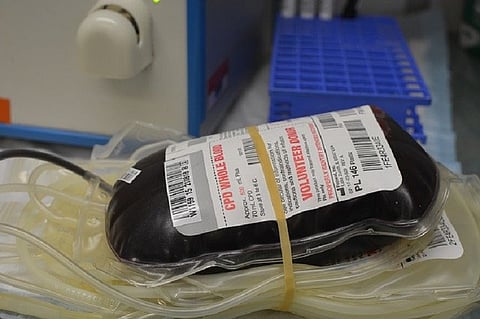

The 21-day lockdown which is in place in Bengaluru as in the rest of the country in a bid to arrest the spread of coronavirus, has inadvertently resulted in a massive drop of regular blood supply at blood banks and hospitals. Doctors whom TNM spoke to suggest intervention is required at this point to mitigate the developing problem.
Other than trauma patients and other medical complications, regular blood transfusion is required by patients suffering from thalassemia, bleeding disorders and other perennial conditions. Dr Sanjay Lenin, Medical Superintendent at St John’s Medical College Hospital, which has one of the larger private blood storing facilities in Bengaluru, said around 400 patients who have thalassemia and other permanent conditions, regularly visit the hospital – and have been affected because of the lockdown.
“There is a shortage of blood, so patients who require repeated transfusion every three weeks or a month have been affected. All blood banks are now forced to ask regular volunteers to come into the hospital. The blood donation camps that were scheduled could not take place. At this time, most blood banks will be able to cater to emergencies. But the bigger challenge is to restore the routine supply. At present we are getting approximately 70% of our usual blood donations received in a week,” he said.
“So what can be done is – residential areas or an apartment block can ask for permission to fix an appointment with the nearest blood bank and they can go to the facility, 2-3 people at a time and donate blood voluntarily. It can also be initiated from the blood banks and hospitals which are in need of blood,” he added.
On the brighter side, he said due to the lockdown, the need for blood to mitigate injuries due to road accidents have also gone down.
Dr Narsima Swamy, medical in-charge of the blood bank run by the Bangalore Medical Services Trust, also says the situation is worrying. The organisation has 27 storage centres across Bengaluru and supplies blood to both government and private medical facilities.
“We used to collect 3,000 units of blood per month, now we are down to 500-600 units since the pandemic started,” he said.
“In case of thalassemia patients, we are forced to ask them to bring a friend or relative to give replacement blood. This is the first time in 35 years that we cannot manage based on voluntary donations. So we have only one solution to this, healthy donors have to walk themselves to the nearest blood banks or hospitals,” he added.
He said once authorised by the blood bank or hospitals, the donors can freely travel to and fro to the facility as police have authorised them to give them curfew passes.
“We are reaching out to frequent donors, encouraging friends, relatives and staff, and easing up logistics,” Dr Anoop Amarnath, Chief of Clinical Services at Manipal Hospitals said.